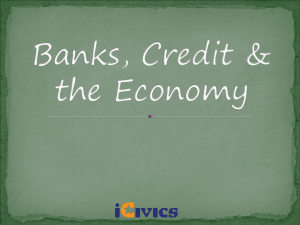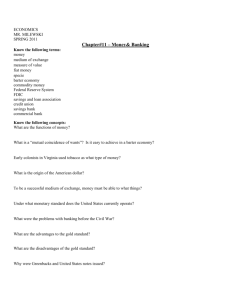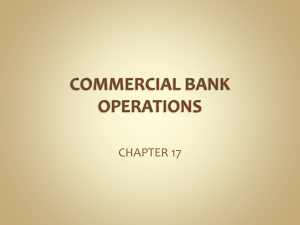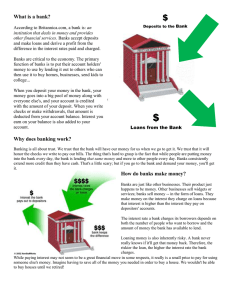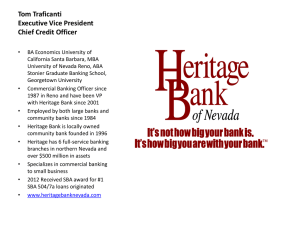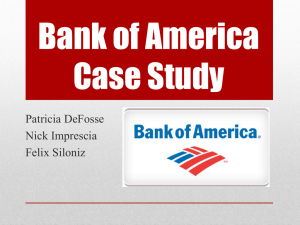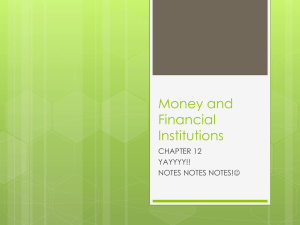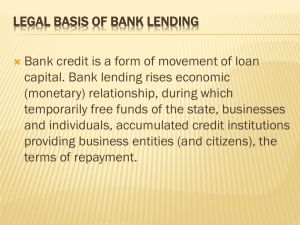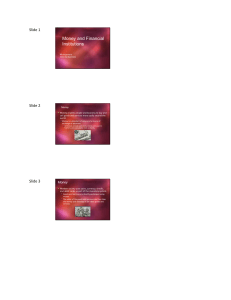Ch12 - Money & The Fed
advertisement
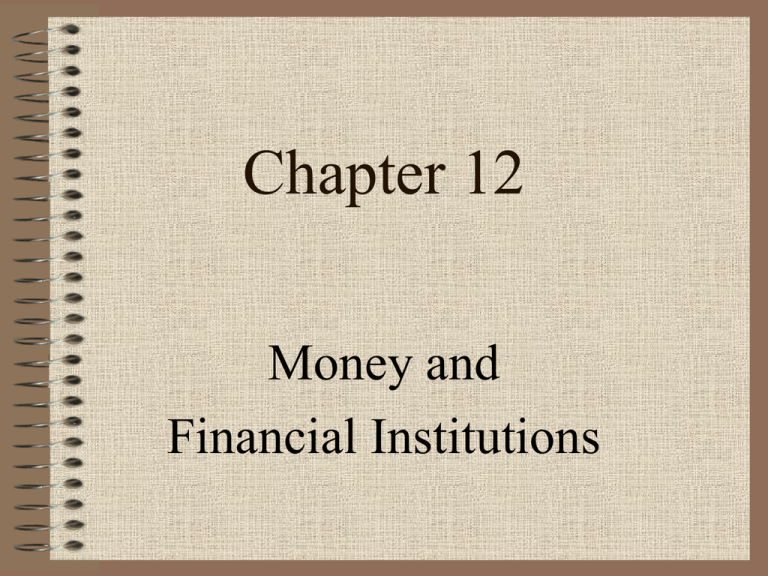
Chapter 12 Money and Financial Institutions Learning Objectives 1.Describe the functions and characteristics of money. 2.Explain the 3 main functions of a bank. Why It’s Important Understanding the way money and financial institutions work is crucial to understanding the economy. Ch 10, 11, 12 - Slide 2 Money Monetary system – G&S are exchanged using money; can then be exchanged for other G&S Money can be anything that people accept as a standard for payment EX: In other times and places people have used shells, stones, corn, parrot feathers, and even gopher tails for money Ch 10, 11, 12 - Slide 3 Functions of Money Medium of Exchange – rather than barter people exchange money to get the goods and services they want Standard of Value – Money allows us to place a value on objects (How much does this cost?) Store of Value – Money holds its value over time…you can also store it and accumulate it to become more wealthy Ch 10, 11, 12 - Slide 4 Characteristics of Money Scarcity – a limited amount available (value) Accepted – people have faith in its value Divisible – can be broken down into smaller pieces/parts Portable – can be transported easily Durable – has a long life/does not fall apart Ch 10, 11, 12 - Slide 5 Banking The banking system is the main type of financial institution, or organization for managing money, in our economy Banks have three main services 1)storing money, 2)transferring money, 3)lending money Ch 10, 11, 12 - Slide 6 ????????????????????????? • What are three characteristics of money (there are five)? – – – – – Scarcity Accepted Divisible Portable Durable Ch 10, 11, 12 - Slide 7 Storing Money A bank account is a record of how much money a customer has put in to or taken out of a bank Deposit – money put into a bank Withdrawal – money taken out of the bank Ch 10, 11, 12 - Slide 8 Transferring and Lending Money -Interest - rate the bank pays you for keeping your money there - electronic funds transfer (EFT) used to move money around by using computer networks - Collateral – item of value you put up for a loan - Mortgage - a deed to give the property to the lender if the loan is not paid back - Safety-deposit boxes – store valuables Ch 10, 11, 12 - Slide 9 ????????????????????????? • What are the three services banks offer? – Storing Money – Lending Money – Transferring Money Ch 10, 11, 12 - Slide 10 HOMEWORK • Rd. Pages 201-205 • Questions 1-3 on Pg. 205 Ch 10, 11, 12 - Slide 11 Learning Objectives 1.Compare the 3 types of banks found in our economy. 2.Identify the functions of the Federal Reserve System. Why It’s Important Understanding the way money and financial institutions work is crucial to understanding the economy. Ch 10, 11, 12 - Slide 12 HOW BANKS DO BUSINESS Banks are businesses that provide financial services to make a profit. Ch 10, 11, 12 - Slide 13 Types of Banks Commercial banks - services such as checking and savings accounts, loans, and financial advice Credit unions offer members a full range of services, including credit cards, checking accounts, and loans Savings and Loan Associations purpose was to encourage people to save money and make it easier to buy a home. Ch 10, 11, 12 - Slide 14 Other Financial Institutions Mortgage companies provide loans specifically for buying a home or business. Financial companies offer short term loans to businesses Insurance companies provide protections against things like fire and theft Brokerage firms sell stocks and bonds, and other financial services Ch 10, 11, 12 - Slide 15 The Federal Reserve System The Federal Reserve System (or Fed) is the central banking organization in the United States • Set up in 1913 to end the periodic financial panics that occurred during the 1800s and early 1900s Ch 10, 11, 12 - Slide 16 Functions of the Fed 1. Clearing Checks 2. Acting as Federal Gov’t’s fiscal agent 3. Supervising member banks 4. Regulating the money supply 5. Setting reserve requirements 6. Supplying paper currency Ch 10, 11, 12 - Slide 17 ????????????????????????? • What is the Federal Reserve? – The central banking organization of the United States Ch 10, 11, 12 - Slide 18 HOMEWORK • Review Key Concepts – Pg. 206 • Questions 2-5 Ch 10, 11, 12 - Slide 19

